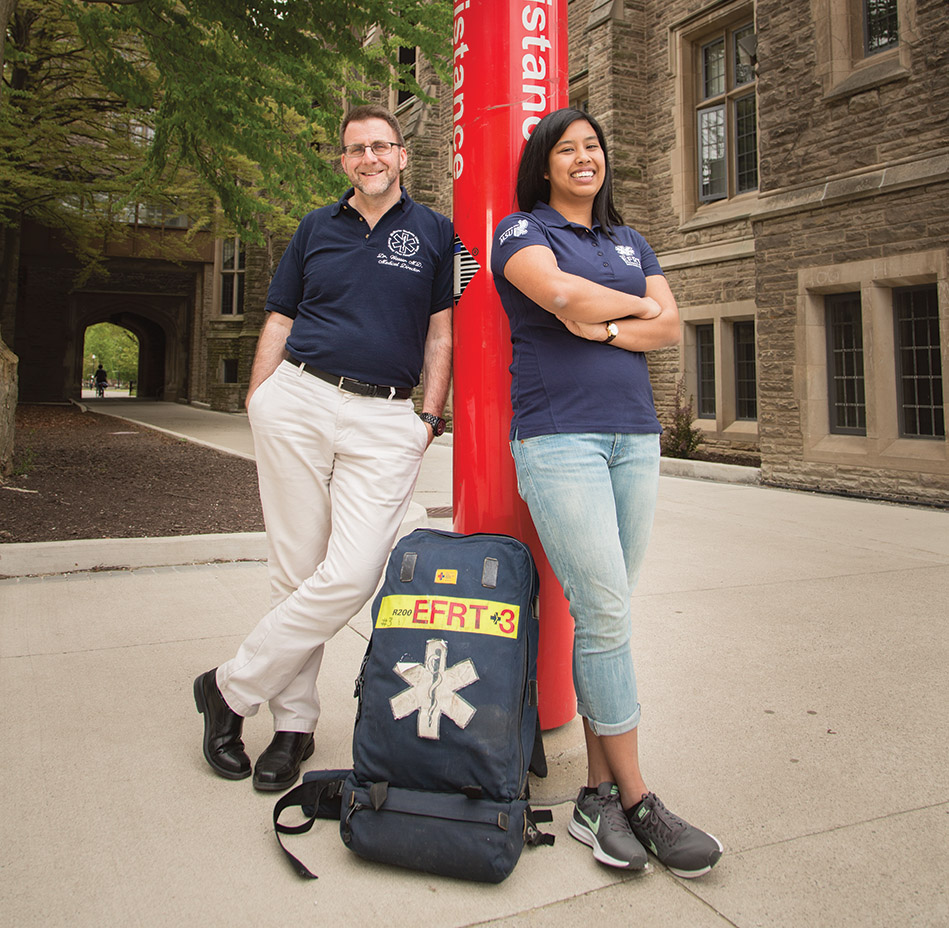35 years of sprains, pains, broken bones… and saving lives

Dial 88 from any campus phone or look for one of the red poles – and within three minutes the Emergency First Response Team will be there. On the eve of EFRT’s 35th anniversary, founder Eddie Wasser ’86, ’89 gets together with Samantha Aung, 2017-18 program director, to compare notes on what it takes to be a first responder.
If you ever find yourself responding to a medical emergency, Dr. Eddie Wasser has some advice for you: The first pulse you take is your own.
“Take a breath, calm yourself, and then engage,” says Wasser, who graduated with his MD from McMaster in 1989 and now serves as medical director for the Prime Minister’s Protective Detail of the RCMP. “It’s up to you to bring the tempo down.”
Staying calm is second nature to Wasser. As a teen growing up in Quebec, he helped pay for college by working as a paramedic. “I just loved it,” he says. The job was exciting, he could work evenings and weekends, and the pay was good. “And I realized there are a lot of people who are a lot less fortunate. I grew up really quickly.”
In his first semester at Mac, Wasser came across an article in The Silhouette. It had taken 20 minutes for an ambulance to arrive after a student had fainted. This didn’t make sense to Wasser, as there’s a medical centre on campus. He discovered that ambulance stations in Hamilton were located where the action was: downtown, the steel mills, and near highways.
Wasser met with then-president Alvin Lee, ’93 (hon.) who gave him the go-ahead – if Wasser found a medical professional to back him up. Wasser located Frank Baillie ’79, a surgeon and McMaster faculty member, who was involved in setting up the province’s first paramedics program and wanted to expand its community outreach. “Without Dr. Lee and Dr. Baillie, this wouldn’t have happened,” recalls Wasser.
Still only in his first semester, Wasser had helped launch the first student-run emergency medical service at a Canadian university.
Thirty-five years later, EFRT is still going strong. The service runs 24 hours a day, seven days a week during the school year, and on weekdays from nine to five in the summer months. The team of 30 student volunteers is trained in Red Cross Emergency Medical Responder and Mental Health First Aid. More senior students are trained in International Trauma Life Support and Advanced Medical Life Support.
To become EFRT responders, students must have up-to-date first aid certification – and they must make it through a comprehensive, multi-day application process to show they have the maturity, the physical fitness and the skills to handle the job. Each year, only eight to twelve rookies are selected from a pool of more than 100 applicants.
Samantha Aung didn’t make it the first time. She had been a lifeguard in high school and saw the EFRT booth during orientation week. “I thought it would be fun and a way to expand what I already knew,” she recalls. Although she was turned down, she knew from the application experience that she wanted it. The next year, she made the team. “I’ve learned so much,” says Aung, now a fourth-year life sciences student. “It’s really cool having a network of people who are passionate about the same things. We all grew together.”
“I’m loving hearing this 35 years later,” says Wasser, who serves as EFRT’s medical director, writing medical protocols and providing guidance. In 1990 he founded Medevaq, an organization that offers assistance to Canadians abroad, among other medical services. He was inducted into the McMaster Alumni Gallery in 2013.
“And have you made great friends?” Wasser asks Aung. “Yes, it’s my little family,” she replies, smiling.
At the end of her second year with EFRT, Aung was hired as program director. She works up to 20 hours a week and is also on call as back-up. The $122,000 budget – a tad higher than Wasser’s $1,000 – is funded by first-aid courses, university contributions, and student fees (currently $1.63 per student).
Aung is now working on plans for the 35th anniversary event on November 4, including fundraising for new bikes and equipment.
Isn’t all this a huge time commitment? “I guess so,” she replies. “But in the best way possible.”


